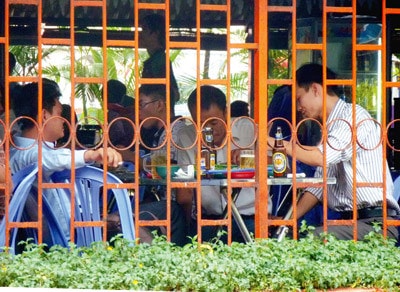Prime Minister is impatient with the problem of "drinking addiction" among civil servants and public employees.
The Prime Minister's recent directive once again shows that the head of the Government is extremely impatient with the current working style of many civil servants and public employees.
This is not the first time a State agency has issued a directive banning alcohol consumption during working hours, especially during lunch breaks. Previously, in 2013, believing that civil servants in the industry were not strictly following public discipline, the then Minister of Justice, Mr. Ha Hung Cuong, requested a ban on drinking alcohol before and during working hours.
Because this Minister believes that drinking alcohol and beer during working hours and lunch breaks will affect the quality of work, style and reputation of cadres, civil servants and public employees. It seems that despite the ban, "the alcohol movement is still flourishing".
 |
| The pub is always crowded, among the diners are many civil servants and public employees (Internet photo) |
A number worth pondering: Every year, Vietnamese people consume more than 3 billion liters of beer. There are no statistics on alcohol (imported alcohol, alcohol produced in domestic factories, alcohol brewed by hand in families...). It comes with a series of consequences of diseases, traffic accidents, violence (disturbing public order, domestic violence) and especially, after "endless" drinking parties, the image of civil servants and public employees in State agencies is distorted.
There was once a hospital director who drank alcohol at noon, his face was red with anger… he cursed reporters and people around him like a real Chi Pheo; And most recently, after a "drinking party", two officials from Binh Thuan also got into a "fight" after a drinking party.
Recently, many people have been upset because when they come to government agencies and interact with officials and civil servants, they reek of alcohol, have an arrogant and authoritarian attitude, and are even rude to the elderly. Such behavior is not strictly handled, leading to a state of "immunity", not afraid of any rules or regulations; they - officials who like to drink, give themselves the right to rule over the people, and insult the people when they are not satisfied. And another problem is that the State has been "stolen" by them a lot of time to go drinking.
Many people who have been on business trips to the mountains share that, if they want to get things done, they have to "greet" each other with wine in the morning and only with wine can they easily get into the action and get things done. This way of handling work has probably decreased a lot now, but it is not gone. A few glasses of wine in the morning can make the whole day of work sluggish and lethargic. In that state of mind, which cadres are aware of whether their behavior is appropriate or not, and whether they have handled work scientifically and satisfactorily?
Remember, in 2015, the National Assembly's Committee on Social Affairs ordered the Institute of Sociology to conduct a community consultation on alcohol abuse in Vietnam, which showed that the three groups that drank the most alcohol were civil servants (over 38%), especially civil servants in Hanoi with over 48%, followed by freelance workers (38%) and young people (25%).
Why do civil servants and public employees drink so much? Some say that "civil servants and public employees do not have to pay". In fact, this is just one reason, because there are still countless drinking parties organized in the style of "contributing rice to cook rice together", civil servants and public employees still spend their own money to go drinking as usual. But where does that money come from? Certainly not from monthly salaries but from other benefits, from begging people and businesses.
And there is another reason, due to poor ability, not being able to think of work to do or not being able to do it even if assigned work... so only thinking about drinking.
Our country is still poor, the team of civil servants and public employees is large but they work ineffectively, always harassing and bullying the people and businesses - the people who pay taxes to support these civil servants. However, after being made difficult, when the work is a little "smooth and comfortable", the people and businesses have to "thank the State officials". This is the vicious cycle that allows the bad habits of those who "drunken all day" to thrive.
Do not drink alcohol during working hours, lunch breaks, and even after the working day, if you drink, you must do so in moderation and within limits. You cannot get drunk to the point of fighting and causing injuries like the two officials in Binh Thuan. There are so many taboos in the workplace, if strictly implemented, there will certainly be truly diligent civil servants, working effectively and worthy of their salaries from the people's tax money.
How to do it well? First of all, the leader and the head of the unit must set an example for the staff to follow. Only when the leader is exemplary and serious can he speak to his subordinates. If he continues to be careless and not determined, after this Prime Minister's Directive, everything will "remain the same"./.
According to VOV

.jpg)


